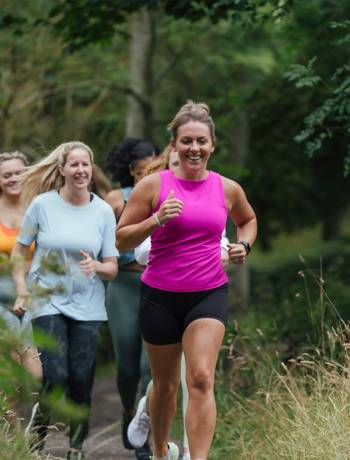Health
The healthy eating trap
by Helen Foster

We’ve more food choices than ever before – and stacks of advice on healthy diets – so why do the latest gures say we’re still not gbetting enough of the right nutrients? Helen Foster investigates...
Breakfast: smashed avocado information on the nation’s food to provide the healthy omega-3 fats on spelt bread and a golden consumption, has shown some really we need is 140g (one portion). latte (with almond milk). shocking facts about what we’re A significant 27% of women have low Lunch: a superfood salad of kale, tomatoes, carrots, lettuce and walnuts. Afternoon snack: rice cakes and coconut water. Dinner: steamed fish, leeks and courgetti.
If you’d eaten that, you’d probably feel proud of yourself. It’s mostly vegan (very 2018), dairy-free and low-carb. So it might surprise you to hear it’s also pretty unhealthy – low in iron and protein, lacking in B vitamins and containing barely any calcium. ‘The Government’s latest National Diet and Nutrition Survey, which collects eating,’ says nutritionist Dr Emma Derbyshire. ‘And while that might be because some people are eating utter rubbish, another reason is the incorrect information we’re being fed about eating healthily – often from unqualified people on social media.’
The list of what we’re lacking is long. We’re eating less folate, fibre, fruit and vegetables than we should, according to the survey. On top of that, says Dr Derbyshire, ‘the average woman consumes just 56g of oily fish a week – when the amount needed iron levels, according to the survey, which can increase the risk of anaemia. When it comes to vitamin D, we should be having 10mcg a day but the average woman gets just 3.9mcg a day, and that’s including those using supplements.’
So what's gone wrong?
Experts say there is a huge amount of misleading information available about how to eat more healthily. ‘When we try to lose weight or change our diets, we focus on what we need to remove from our diet but we don’t think about what imbalances that may cause and how to make up for those,’ says obesity specialist Dr Sally Norton.
Extra energy
Take iodine, another nutrient highlighted as a problem in the National Diet and Nutrition Survey. We need iodine for good metabolism and some studies suggest women with iodine deficiency may have problems conceiving. One of the main sources of this key nutrient is dairy products – so, if you’re swapping your normal latte for a turmeric one with almond milk, you’re not getting that same iodine shot each morning. When researchers at the University of Surrey looked at the iodine content of 47 ‘health’ milks, including soy, coconut, almond, rice and oat, they found they contained about 2% of the amount found in dairy and, unless they’re fortified, they don’t supply the same amounts of calcium or vitamin D, either. We might use them as a dairy replacement but they don’t replace all the nutrients dairy contains. Getting into a rut over meals is another reason we lack some vital nutrients.
A study by Arla Protein found that six out of 10 of us eat the same foods day in, day out. And unless that diet is perfectly balanced, that’s a recipe for deficiency. ‘A diet needs to be varied,’ says Dr Norton. ‘You should be trying all sorts of different foods.’ ‘The big problem with nutrient deficiencies is that it’s very hard to tell if you have one,’ says Dr Emma Derbyshire. ‘You might think you feel fine, but if you were getting all the nutrients you need, you might not need that coffee for an energy boost or you might not get those mood swings. I absolutely believe the rise in mental health issues like depression has something to do with our diet.'
Other experts agree. A Bristol University study found that vegetarians and vegans were more likely to suffer depression than those who eat meat. One reason may be because 52 per cent of vegans and seven per cent of vegetarians have low levels of B12, which is essential for the healthy production of brain chemicals.
Eat smarter
There are simple things you can do to maximise your nutrients – and consuming fortified products, such as eggs with extra omega-3, is a good place to begin. ‘Start measuring things by the amount of nutrients they contain rather than calories,’ says Dr Sally Norton. While two rice cakes might only have 70 calories, you’d be far better eating a more nutritious snack, such as carrot sticks with houmous. Other tips include:
If you remove something from your diet, find a replacement. ‘Research what nutrients it provides and find alternative sources,’ advises Dr Norton.
Try new flavours. ‘Diversity is essential if you’re going to get all the nutrients you need,’ continues Dr Norton. If we look at the Japanese diet, one of the healthiest, we should be eating 30 different foods items a day and 100 a week. While that might be a little ambitious, we can learn a lot from their idea of adding small portions of lots of different items to a dish.
Be more adventurous. As you’re reading this magazine, we guess you love to cook, so try making a dish with a fish, grain, fruit or vegetable you’ve never tried before. You’d be surprised how many of them there are. Have you ever had mooli, amaranth or Romanesco, for example? When did you last eat traditional food, such as gooseberries, rhubarb or swede?
Think about supplements. ‘I don’t agree with everyone taking multivitamins but I do agree with targeted amounts of high-quality supplements that their body needs,’ says dietitian Gillian Killiner. The only way to find out exactly what you are lacking is to have a proper analysis of your diet with a qualified dietitian or nutritionist. If you do take supplements, be consistent, otherwise you’re wasting your time, says Dr Emma Derbyshire.
Stay in balance. ‘A healthy diet is a balanced one,’ says Gillian Killiner. ‘We’ve really lost sight of that, and it’s as if there’s now a U-shaped curve of eating – people eating rubbish at the top of one side and those cutting out lots of foods in a misguided aim to be healthy at the top of the other. We need to get back into the middle to be healthy again.’

How to get what you're lacking
FOLATE
Recommended amount: 200 microgrammes daily Good sources: Leafy green vegetables, fortified cereal, beans and legumes How much you need to eat: 100g cooked lentils or 250g cooked spinach.
FIBRE
Recommended amount: 30g a day Good sources: Wholegrain carbs like bran flakes, granary bread, fruit and vegetables. How much you need to eat: 30g bran flakes (4.3g of fibre), 2 slices of high fibre bread (2g), 200g baked beans (10.4g) 100g pasta (4g) and 150g peas (12g).
IRON
Recommended amount: 14.8mg daily for women under 50, 8.7mg for those over Good sources: Red meat, dark green vegetables, fortified cereal How much you need to eat: 300g red meat.
VITAMIN D
Recommended amount: 10 microgrammes daily Good sources: Oily fish, fortified milks, egg yolks How much you need to eat: 75g salmon.
OMEGA-3
Recommended amount: 450mg a day Good sources: Oily fish How much you need to eat: 1 x 140g portion of fish per week (suggested).












